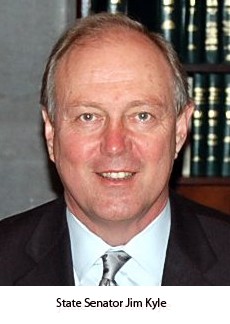
It will soon be official, on Tuesday of next week, in fact. State
senator Jim Kyle of Memphis, who in recent years has been
serving as the Democrats’ leader in the Senate, will officially declare
his candidacy for governor in the course of a combination
announcement/rally at the McWherter Library at the University of
Memphis. Given the fact that Jackson businessman Mike McWherter,
son of former Governor Ned Ray McWherter, is one of Kyle’s
opponents for the Democratic nomination, and perhaps the most
formidable overall, Kyle’s choice of venue can hardly be regarded as
accidental.
A sample of what his website will look like was forwarded to the
Flyer, containing the candidate’s promise to stay in touch with
his would-be statewide constituents via Facebook, making for one more
high-tech vote in the candidate field of 2010. No less a conservative’s
conservative than U.S. representative Zach Wamp, a Chattanooga
Republican who also aspires to be governor, is a tweeter’s tweeter.
Kyle, too, is a devotee of Twitter. Indeed, it is by means of fairly
constant tweeting that he has kept journalists and supporters aware of
his intentions for the last several weeks.
• If modern technology is having its day in Tennessee politics,
so is conservative politics — be that fact, coincidental,
causative, ironic, or whatever.
Obscured in some of the schadenfreude experienced by Democrats
during the Republicans’ Paul Stanley debacle (see Editorial, p.
16) is the fact that Stanley’s replacement as the state senator from
District 31, one of the most conservative bailiwicks in the state, is
going to be at least as conservative as the down-the-line Republican
Stanley was, and possibly more so.
The main contenders in the Republican primary are state
representatives Brian Kelsey and Steve McManus and Shelby
County school board president David Pickler. The two legislators
have voting records that hew to the right of the political spectrum
quite as much as Stanley did, and Pickler, whose main concern for the
last few years has been the conversion of the Shelby County schools
into a special school district, is likely to go in that direction as
well.
Democrats will undoubtedly field a candidate but one with little
chance of winning.
• In the event that either Kelsey or McManus would win, the
legislature’s Republicans would find themselves with a bit of a problem
in the state House of Representatives, which, as of the 2008 elections,
has a Republican majority for the first time in history but only by a
tenuous 50-49 margin.
Should the special-election winner be Kelsey or McManus, there would
be a resultant vacancy in the state House. That would create a dead
heat — 49 Republicans, 49 Democrats — with control of the
House up for grabs going into the 2010 legislative session.
It is hard to imagine a more crucial turning-point issue. And who
gets to name the replacement for Kelsey, who has already announced for
Stanley’s seat, or some other House member? The Democratic-controlled
Shelby County Commission, numbering as of now eight Democrats and five
Republicans.
And the commission’s 8-5 split — a change from the previous
lineup favoring Democrats 7-6 — exists because the body’s
Democratic majority exercised its numerical edge to vote in Matt
Kuhn, a Democrat, to succeed David Lillard, who had resigned
to become state treasurer.
The Kuhn vote was the result of significant pressure from local
Democrats. But the degree of pressure would magnify enormously when the
issue becomes that of controlling the state House of
Representatives.
Commission chair Deidre Malone, a Democrat, acknowledged that
circumstance when asked last week about her potential vote to fill a
state House vacancy. “Wow!” said Malone, who had previously indicated
she would support a Republican if the commission were asked to fill
Stanley’s Senate seat in a body with a comfortable GOP majority. But
the House vacancy was clearly another matter. “I’d have to listen to
the advice and wishes of other Democrats. I’m a good Democratic
soldier,” she said.
Of course, if Kelsey or another Republican House member should win
the special election for Stanley’s seat late this year, Governor
Phil Bredesen (a Democrat, coincidentally, who took his lumps
from the majority-GOP legislature in 2009) would then be asked to call
another special election for the open House seat. Crucially, he would
have up to 20 days to do so. After that, the Shelby County Election
Commission could not schedule a special-election primary for another 55
days. Another 55 days would have to elapse before a general election
could be scheduled in the House district.
Altogether, that’s 130 days — a little more than four months,
or the length of the average legislative session. In practice, the
permanent succession would await resolution in the regular 2010
election cycle.
Looking at that prospect of Democratic control of the House for an
entire legislative session, some Republicans might come to wish they
hadn’t arm-twisted the wounded Stanley into resigning. Meanwhile,
Pickler would be sure to point the succession problem out to Republican
voters as a factor weighing in his favor.
• The arm-twisting came later, but it came. By the end of last
week, it had become irresistible.
The first tip-off that Stanley’s days were numbered came when Shelby
County Republican chairman Lang Wiseman, contending that “the
time has come for this spectacle to end,” issued a press release
calling for the scandal-plagued Stanley to resign his seat, even if
that opens the way to an immediate Democratic successor.
The next name Republican to call for Stanley to step down was state
senator Mark Norris of Collierville, the Senate’s majority
leader.
And Lt. Governor Ron Ramsey completed the trifecta.
Eliminating any doubt as to whether he had helped Stanley make up his
mind about resigning, Ramsey, the Blountville Republican who presides
over that body and had secured Stanley’s resignation from his Commerce
Committee chairmanship the week before, said in Memphis last Wednesday
that he had communicated repeatedly with the reluctant Stanley on
Monday and Tuesday of that week, urging that the senator vacate his
seat altogether.
Ramsey said Stanley had offered some resistance to the idea: “He had
a few reasons why he wanted to wait a day or two before he he
resigned.”
Ramsey was in Memphis at the Grove Grill in East Memphis for an
Associated Builders and Contractors meet-and-greet affair, where he
appeared along with two fellow gubernatorial candidates, District
Attorney General Bill Gibbons of Memphis and Knoxville mayor
Bill Haslam.
Answering questions after the ABC affair, Ramsey said that, after
his initial verbal approaches, he had continued to insist that Stanley
resign via text messages to the Germantown Republican. Stanley would
eventually announce his resignation from the Senate late Tuesday
afternoon.
Ramsey said, “I’m not sure Mark Norris ever talked to him, from what
I’ve heard, but I talked to him about three times. … I am relieved
that it’s over. I was very upset with Paul at the time over what he
did. I didn’t condone what he did. As a matter of fact, I condemned
what he did.”
Meanwhile, said Ramsey, he was “looking forward” to the forthcoming
special election to fill Stanley’s District 31 seat. The Shelby County
Election Commission met this week to set the date at October 15th for
both it and the special mayoral election.


